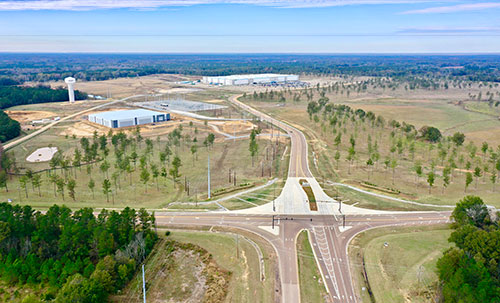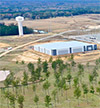Home Sweet Home: Mississippi’s Business Climate Makes It Hard to Leave
Its network of transportation options, low tax rates, workforce pipeline, and government support are among the reasons companies in the aerospace, auto, and other sectors choose to expand in Mississippi.
Q4 2023

There are plenty of good reasons for doing business in Mississippi — which is why most companies, when it is time to expand, stay in the Magnolia State.
A key business advantage is Mississippi’s central location. Located about midway between the East and West coasts, Mississippi has an outstanding network of modern highways, rail transport, airports, and an expansive system of navigable rivers and coastline.
Companies also move to Mississippi because of its reasonable regulatory environment and friendly business climate. With the cost of living nearly 20% below the national average, Mississippi offers value for employers and employees. In addition, Mississippi has one of the lowest corporate tax rates in the U.S. at 5%. The state’s new tax incentive, the Mississippi Flexible Tax Incentive (MFLEX), is a streamlined universal tax credit that is used to offset a company’s state tax liabilities in customized ways that meet a company’s needs the best.
Finding skilled and affordable talent is not a problem for companies when they decide to expand in Mississippi. Eight universities and 15 community colleges provide thousands of well-educated and talented students every year, often with the specialized skills that companies are looking for. More than 20,000 workers have been trained through Mississippi’s workforce and advanced training programs. In particular, an experienced manufacturing workforce has the high-tech skills that the Mississippi growth industries of advanced manufacturing, aerospace and defense, automotive, and energy require.
Committed to Expansion
The Magnolia State offers an innovative and collaborative ecosystem that has led to innovations in every sector. Integrating these breakthroughs into business operations often requires capital investments and/or expanded facilities. These companies typically choose to keep this work in-state, where they have a skilled workforce and solid business support at all levels of government. This collaborative approach is reflected by continued investment in expansion and general investments from the state.
For example, in aerospace and defense, Raytheon recently broke ground on a 17,000-square-foot, $50 million expansion at its consolidated manufacturing center in Forest, creating 100 jobs. The new building will serve as a hub for the production and testing of the Next Generation Jammer Mid-Band pods for the U.S. Navy and Australian government, as well as airborne radar programs.
Located about midway between the East and West coasts, Mississippi has an outstanding network of modern highways, rail transport, airports, and an expansive system of navigable rivers and coastline. For 40 years, Raytheon has been part of the Forest community. This new investment will be Raytheon’s third expansion in the area since 2013. Government support and collaboration is reflected by the contributions of the Mississippi Development Authority (MDA) and Scott County toward building improvements and facility expansion needs.
“As a long-time partner, we see the value of continued investment in Mississippi and its workforce,” said Kim Ernzen, president of Naval Power at Raytheon. “Our Forest facility supports 20 major programs and runs three shifts per day to deliver the advanced technology our customers need. This latest expansion will help us ramp up production for a critical airborne electronic attack system to address advanced and emerging threats while protecting U.S. and coalition forces.”
Support at All Levels
Leading 3D-printed rocket company Relativity Space has started construction on a new vertical test stand at the A-2 complex located at NASA’s Stennis Space Center. The $267 million expansion will create 630 jobs. The new test stand, part of the larger expansion, will support advanced vertical stage testing for Terran R, the company’s medium-to-heavy–lift reusable rocket. Other improvements include a full-scale second-stage stand, office buildings, and a vehicle hangar. The expansion brings Relativity’s total footprint at the site to nearly 300 acres, making it the largest commercial presence at Stennis.
Vital to moving forward with this project was MDA’s assistance for infrastructure improvements. MDA also provided incentives through the Aerospace Initiative Incentives Program, which provides tax incentives to aerospace companies that locate or expand in Mississippi. Hancock County and Stennis Space Center also contributed to the project.
Eight universities and 15 community colleges provide thousands of well-educated and talented students every year. “New history is being written at Stennis Space Center as we breathe life into the historic A-2 Test Stand with our Terran R program,” said Relativity co-founder and CEO Tim Ellis. “We appreciate the support from NASA and the state of Mississippi and look forward to building out our team and testing infrastructure on the Gulf Coast. Together with our significant private capital commitments, we are working to reinvigorate these facilities and strengthen our innovative capabilities.”
Automotive Continues to Expand
More than 200 automotive-related companies in Mississippi employ nearly 15,000 workers, who produce about 500,000 vehicles every year. Automotive companies continue to expand their facilities to add more capacity. For example, PACCAR, an industry leader in the design, manufacture, and customer support of premium trucks, is expanding its operations in Columbus. The $209 million, 50,000-square-foot project includes space for meeting the future emissions requirements for diesel engines. MDA, Lowndes County, and the Tennessee Valley Authority are assisting with the project.
More than 200 automotive-related companies in Mississippi employ nearly 15,000 workers, who produce about 500,000 vehicles every year. PACCAR has produced more than 300,000 engines in its world-class engine factory in Columbus since 2010. “Its decision to expand operations and create additional job opportunities and investment in Columbus, and support economic growth in the region, is fundamental to TVA’s mission of service,” said John Bradley, TVA senior vice president of Economic Development. “We are proud to be a partner on this project and further that mission.”
Ongoing Support
Mississippi’s pro-business policies and economic development support make the Magnolia State a top contender for both new and established companies interested in building deep community relationships and investing in a strong and capable workforce.
“These recent announcements are the latest reminder of how Mississippi’s efforts to foster economic growth are a vital part of our state’s economic future,” said MDA Deputy Executive Director Laura Hipp. “In addition to creating exciting new opportunities for so many individuals, these new investments will build a stronger tax base and support local businesses.”
Project Announcements
Siemens Energy Plans Pearl, Mississippi, Electric Grid Component Operations
02/04/2026
The Shaw Group Expands Walker, Louisiana, Operations
02/04/2026
Italy-Based Huwell US Plans Cherokee County, South Carolina, Operations
02/04/2026
Eli Lilly and Company Plans Lehigh Valley, Pennsylvania, Manufacturing Operations
02/02/2026
Hadrian Establishes Mesa, Arizona, Manufacturing Operations
02/02/2026
Canada-Based Cyclic Materials Plans McBee, South Carolina, Operations
02/02/2026
Most Read
-
The Workforce Bottleneck in America’s Manufacturing Revival
Q4 2025
-
Data Centers in 2025: When Power Became the Gatekeeper
Q4 2025
-
Speed Built In—The Real Differentiator for 2026 Site Selection Projects
Q1 2026
-
Top States for Doing Business in 2024: A Continued Legacy of Excellence
Q3 2024
-
Preparing for the Next USMCA Shake-Up
Q4 2025
-
Tariff Shockwaves Hit the Industrial Sector
Q4 2025
-
Investors Seek Shelter in Food-Focused Real Estate
Q3 2025
